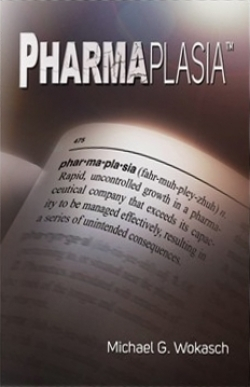Pharmaplasia
“Pharmaplasia” is a term created and trademarked by Michael Wokasch himself. He defines it as “rapid, uncontrolled growth in a pharmaceutical company that exceeds its capacity to be managed effectively, resulting in a series of unintended consequences.”
Wokasch, who received a pharmacy degree and went to work for the industry instead of becoming a pharmacist, uses that definition as a starting point in what can only be described as a wide-ranging indictment of “Big Pharma.” Despite Wokasch’s self-proclaimed love for the industry’s “ability to solve problems,” he says he wrote the book because he is “frustrated by the inexcusable mistakes, poor decisions, and short-sighted thinking that have compromised the public’s trust in the industry and tarnished its reputation.”
Indeed, Wokasch discusses in detail this “increasingly dysfunctional industry” in a book that, unfortunately, confirms what many readers probably already believe. The author offers a behind-the-scenes look at an industry that spends billions on research and markets incessantly to both medical professionals and consumers. The picture he paints is not pretty.
Wokasch points out that the pharmaceutical industry is beset by some challenges of its own creation. For example, he writes, “as pharmaceutical companies become more aggressive in their commercialization efforts, the market will respond with more restrictions and regulations.” And even when the industry comes up with wonder drugs, “consumers and insurers will seek out less expensive alternative treatments to innovative products that are either perceived to be or actually are priced too high.”
Part of the problem going forward, says Wokasch, is that the pharmaceutical industry “must reestablish itself as a trusted, credible source of information, and healthcare professionals must reduce their financial dependence on the industry.” Ironically, it’s almost as if the entire industry seems to have become a drug itself.
In the end, Wokasch explains, pharmaceutical company executives will have to come to the realization that the future is a time when the industry “finally puts patients ahead of everything else.” That may sound simple, but as Wokasch demonstrates in Pharmaplasia, everything about the pharmaceutical industry and the manner in which it is regulated makes it difficult to do just that.
The average reader is likely to find Pharmaplasia sobering, if not a bit dry and pedantic. However, Pharmaplasia is important reading for anyone with a vested interest in the pharmaceutical industry (especially those who work in it). In the context of the recently passed healthcare legislation, this book is particularly relevant.
Reviewed by
Barry Silverstein
Disclosure: This article is not an endorsement, but a review. The publisher of this book provided free copies of the book and paid a small fee to have their book reviewed by a professional reviewer. Foreword Reviews and Clarion Reviews make no guarantee that the publisher will receive a positive review. Foreword Magazine, Inc. is disclosing this in accordance with the Federal Trade Commission’s 16 CFR, Part 255.

